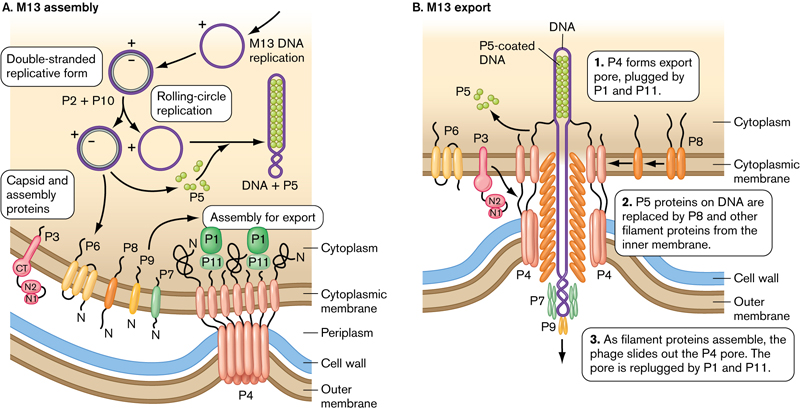Team:Edinburgh/Phage Replication
From 2011.igem.org
(Difference between revisions)
| Line 18: | Line 18: | ||
== Basic model == | == Basic model == | ||
| - | *dx/dt=ax-bvx | + | *'''dx/dt=ax-bvx ''' |
:(Rate of change of quantity of uninfected ''E. coli'' equals to the uninfected ''E. coli'' replicate itself minus the ''E. coli'' infected by M13 phage.) | :(Rate of change of quantity of uninfected ''E. coli'' equals to the uninfected ''E. coli'' replicate itself minus the ''E. coli'' infected by M13 phage.) | ||
| - | *dy/dt=ay+bvx | + | *'''dy/dt=ay+bvx ''' |
:(Rate of change of quantity of infected ''E. coli'' equals to the quantity of infected ''E. coli'' replicate itself plus the ''E. coli'' infected by M13 phage.) | :(Rate of change of quantity of infected ''E. coli'' equals to the quantity of infected ''E. coli'' replicate itself plus the ''E. coli'' infected by M13 phage.) | ||
| - | *dv/dt=cy-bvx-mv | + | *'''dv/dt=cy-bvx-mv ''' |
:(Rate of change of quantity of free phage equals to the phage released by infected ''E. coli'' minus the phage which is to infect an ''E. coli'' and the decayed phage.) | :(Rate of change of quantity of free phage equals to the phage released by infected ''E. coli'' minus the phage which is to infect an ''E. coli'' and the decayed phage.) | ||
Revision as of 16:12, 25 August 2011
A basic activity in biorefinery consists of the degradation of cellulose, due to the presence of enzymes. We are not only concerned with the activities and the amount of enzymes, but also with metabolism and activities of bacteriaphage.
Contents[hide] |
M13 Replication
- The M13 phage attacks E. coli (host), multiplies in the host cell cytoplasm, and is released without causing the bacteria’s death (non-lytic).
Basic model
- dx/dt=ax-bvx
- (Rate of change of quantity of uninfected E. coli equals to the uninfected E. coli replicate itself minus the E. coli infected by M13 phage.)
- dy/dt=ay+bvx
- (Rate of change of quantity of infected E. coli equals to the quantity of infected E. coli replicate itself plus the E. coli infected by M13 phage.)
- dv/dt=cy-bvx-mv
- (Rate of change of quantity of free phage equals to the phage released by infected E. coli minus the phage which is to infect an E. coli and the decayed phage.)
- X(t) — uninfected E. coli
- Y(t) — infected E. coli
- V(t) — free phage
- a — replication coefficient of E. coli
- b — transmission coefficient of phage
- c — replication coefficient of phage
- m — decay rate of phage
Assumptions
- any host responses against bacteria or against phages are neglected
Simulations
The matlab code: File:Matlab_code_phagerep.txt uses runge-kutta method of order four to solve the system.
The above figure shows a simulation going over 15 hours. The simulation shows the infected E.coli population dominates.And the phage population decreases at first then increases.
References
- Slonczewski JL, Foster JW (2010) [http://www.wwnorton.com/college/biology/microbiology2/ch/11/etopics.aspx Microbiology: An Evolving Science], 2nd edition. W. W. Norton & Company
- Robert J.H Payne, Vincent A. A. Jansen(2011)[ http://personal.rhul.ac.uk/ujba/115/jtb01.pdf: Understanding Bacteriaphage therapy as a density-dependent kinetic process]
- Cattoen C (2003) [http://msor.victoria.ac.nz/twiki/pub/Groups/GravityGroup/PreviousProjectsInAppliedMathematics/bacteria-phage_REPORT.pdf: Bacteriaphage mathematical model applied to the cheese industry]
 "
"

